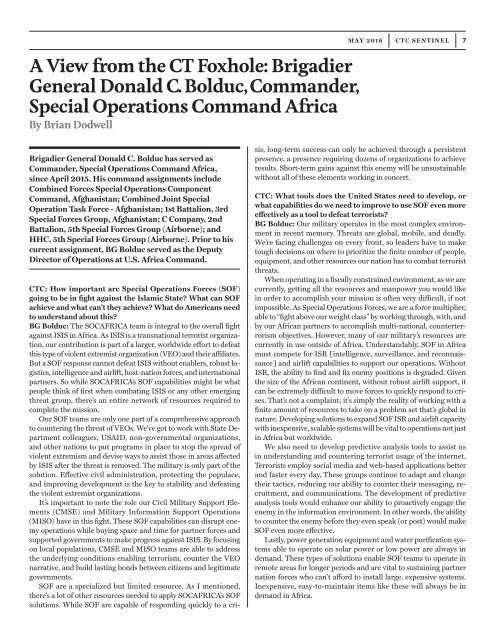The Challenges of Explosive Detection
CTC-SENTINEL_Vol9Iss58
CTC-SENTINEL_Vol9Iss58
Create successful ePaper yourself
Turn your PDF publications into a flip-book with our unique Google optimized e-Paper software.
A View from the CT Foxhole: Brigadier<br />
General Donald C. Bolduc, Commander,<br />
Special Operations Command Africa<br />
By Brian Dodwell<br />
MAY 2016 CTC SENTINEL 7<br />
Brigadier General Donald C. Bolduc has served as<br />
Commander, Special Operations Command Africa,<br />
since April 2015. His command assignments include<br />
Combined Forces Special Operations Component<br />
Command, Afghanistan; Combined Joint Special<br />
Operation Task Force - Afghanistan; 1st Battalion, 3rd<br />
Special Forces Group, Afghanistan; C Company, 2nd<br />
Battalion, 5th Special Forces Group (Airborne); and<br />
HHC, 5th Special Forces Group (Airborne). Prior to his<br />
current assignment, BG Bolduc served as the Deputy<br />
Director <strong>of</strong> Operations at U.S. Africa Command.<br />
CTC: How important are Special Operations Forces (SOF)<br />
going to be in fight against the Islamic State? What can SOF<br />
achieve and what can’t they achieve? What do Americans need<br />
to understand about this?<br />
BG Bolduc: <strong>The</strong> SOCAFRICA team is integral to the overall fight<br />
against ISIS in Africa. As ISIS is a transnational terrorist organization,<br />
our contribution is part <strong>of</strong> a larger, worldwide effort to defeat<br />
this type <strong>of</strong> violent extremist organization (VEO) and their affiliates.<br />
But a SOF response cannot defeat ISIS without enablers, robust logistics,<br />
intelligence and airlift, host-nation forces, and international<br />
partners. So while SOCAFRICA’s SOF capabilities might be what<br />
people think <strong>of</strong> first when combating ISIS or any other emerging<br />
threat group, there’s an entire network <strong>of</strong> resources required to<br />
complete the mission.<br />
Our SOF teams are only one part <strong>of</strong> a comprehensive approach<br />
to countering the threat <strong>of</strong> VEOs. We’ve got to work with State Department<br />
colleagues, USAID, non-governmental organizations,<br />
and other nations to put programs in place to stop the spread <strong>of</strong><br />
violent extremism and devise ways to assist those in areas affected<br />
by ISIS after the threat is removed. <strong>The</strong> military is only part <strong>of</strong> the<br />
solution. Effective civil administration, protecting the populace,<br />
and improving development is the key to stability and defeating<br />
the violent extremist organizations.<br />
It’s important to note the role our Civil Military Support Elements<br />
(CMSE) and Military Information Support Operations<br />
(MISO) have in this fight. <strong>The</strong>se SOF capabilities can disrupt enemy<br />
operations while buying space and time for partner forces and<br />
supported governments to make progress against ISIS. By focusing<br />
on local populations, CMSE and MISO teams are able to address<br />
the underlying conditions enabling terrorism, counter the VEO<br />
narrative, and build lasting bonds between citizens and legitimate<br />
governments.<br />
SOF are a specialized but limited resource. As I mentioned,<br />
there’s a lot <strong>of</strong> other resources needed to apply SOCAFRICA’s SOF<br />
solutions. While SOF are capable <strong>of</strong> responding quickly to a crisis,<br />
long-term success can only be achieved through a persistent<br />
presence, a presence requiring dozens <strong>of</strong> organizations to achieve<br />
results. Short-term gains against this enemy will be unsustainable<br />
without all <strong>of</strong> these elements working in concert.<br />
CTC: What tools does the United States need to develop, or<br />
what capabilities do we need to improve to use SOF even more<br />
effectively as a tool to defeat terrorists?<br />
BG Bolduc: Our military operates in the most complex environment<br />
in recent memory. Threats are global, mobile, and deadly.<br />
We’re facing challenges on every front, so leaders have to make<br />
tough decisions on where to prioritize the finite number <strong>of</strong> people,<br />
equipment, and other resources our nation has to combat terrorist<br />
threats.<br />
When operating in a fiscally constrained environment, as we are<br />
currently, getting all the resources and manpower you would like<br />
in order to accomplish your mission is <strong>of</strong>ten very difficult, if not<br />
impossible. As Special Operations Forces, we are a force multiplier,<br />
able to “fight above our weight class” by working through, with, and<br />
by our African partners to accomplish multi-national, counterterrorism<br />
objectives. However, many <strong>of</strong> our military’s resources are<br />
currently in use outside <strong>of</strong> Africa. Understandably, SOF in Africa<br />
must compete for ISR [intelligence, surveillance, and reconnaissance]<br />
and airlift capabilities to support our operations. Without<br />
ISR, the ability to find and fix enemy positions is degraded. Given<br />
the size <strong>of</strong> the African continent, without robust airlift support, it<br />
can be extremely difficult to move forces to quickly respond to crises.<br />
That’s not a complaint; it’s simply the reality <strong>of</strong> working with a<br />
finite amount <strong>of</strong> resources to take on a problem set that’s global in<br />
nature. Developing solutions to expand SOF ISR and airlift capacity<br />
with inexpensive, scalable systems will be vital to operations not just<br />
in Africa but worldwide.<br />
We also need to develop predictive analysis tools to assist us<br />
in understanding and countering terrorist usage <strong>of</strong> the internet.<br />
Terrorists employ social media and web-based applications better<br />
and faster every day. <strong>The</strong>se groups continue to adapt and change<br />
their tactics, reducing our ability to counter their messaging, recruitment,<br />
and communications. <strong>The</strong> development <strong>of</strong> predictive<br />
analysis tools would enhance our ability to proactively engage the<br />
enemy in the information environment. In other words, the ability<br />
to counter the enemy before they even speak (or post) would make<br />
SOF even more effective.<br />
Lastly, power generation equipment and water purification systems<br />
able to operate on solar power or low power are always in<br />
demand. <strong>The</strong>se types <strong>of</strong> solutions enable SOF teams to operate in<br />
remote areas for longer periods and are vital to sustaining partner<br />
nation forces who can’t afford to install large, expensive systems.<br />
Inexpensive, easy-to-maintain items like these will always be in<br />
demand in Africa.


